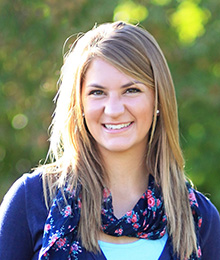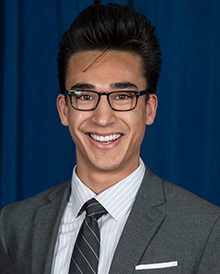Sandia student interns Hattie Schunk and Julian A. Vigil have been named 2016 Goldwater Scholars.
The undergraduate scholarship, established on a national basis by Congress in 1986 to honor former senator Barry Goldwater, annually pays tuition, fees, books, and room and board for 250 college sophomores and juniors pursuing research careers in mathematics, the natural sciences, or engineering.
Hattie Schunk

Hattie Schunk
A chemical engineering major at Texas Tech University, Hattie plans to earn a doctorate in bioengineering with the ultimate intent of improving medical diagnostic capabilities, devices and therapies. She worked last summer under the mentorship of Sandia researcher Hongyou Fan to assemble functional nanoparticles, on which she co-authored a peer-reviewed publication, “Nanomaterials under stress: a new opportunity for nanomaterials synthesis and engineering,” with Hongyou last November in the Materials Research Society Bulletin. Her projects were funded through Sandia’s Laboratory Directed Research and Development (LDRD) program and the DOE’s Basic Energy Sciences office. Her current work researches methods to control nanoparticle structure and composition, the intended subject of another technical article to be completed during the 2016-17 school year. She’ll return to Sandia this summer to work further with Hongyou.
Julian Vigil

Julian Vigil
Julian, a student at the University of New Mexico majoring in chemical engineering, conducts research on electrochemical catalysis relating to energy conversion and storage under the supervision of Timothy Lambert, with whom he has co-authored six peer–reviewed publications, including three as first author. His latest, “Cobalt phosphide-based nanoparticles as bifunctional electrocatalysts for alkaline water splitting,” appearing in 2016 in the Journal of Materials Chemistry A, was about development of nanoparticle bi-functional electrocatalysts that can split water into hydrogen and oxygen. But the prolific student scholar has another in preparation and in fact has been contributing since he was in high school, says Tim, mentor of Julian since the summer following his junior year when he enrolled in Sandia’s STAR program. Julian’s Sandia work has been funded by LDRD, and he ultimately intends to perform research and teach at the university level.